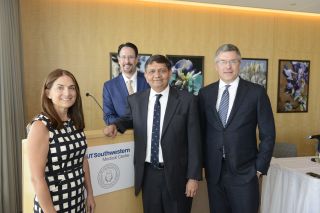Depression
Detection and Management of Depression and Bipolar Disease
Launch of Center for Depression Research and Clinical Care at UT Southwestern
Posted October 1, 2015
My jokes were met with stone cold silence except for the lanky Indian man giggling into his clenched fist. The year was 2010, at one of my first public talks regarding my depression and recovery at a medical facility. I assumed I’d be speaking to interns and residents. From the pallor of the audience, all of them seemed depressed. I knew the jokes worked, I’d used them before with great success. Perhaps the professionals got busy and they unloaded the psych ward at my talk. FYI, depressed people don’t get jokes. Depression lands the brain in sludge; humor requires a lightness and agility of synapses. I empathized and ignored the crickets.

Little did I know that the one man who laughed, Dr. Madhukar Trivedi, lent factual basis to many of the basic things I do to keep my depression in check. His research, in cooperation with the Cooper Aerobics Center, verified that as little as 150 minutes of exercise per week can have a profound impact on depression, sometimes eliminating depression completely, increasing the effectiveness of antidepressants, and cutting relapse rates in half. Finally, I’d found a psychiatrist who understood that depression is not solved by a single pill, procedure or therapy, but an integrated, customized approach. When he spoke, his dry sense of humor sealed the deal of our friendship.

Recently our family foundation has given a lead $5 million gift to support the Center for Depression Research and Clinical Care at UT Southwestern, under the direction of Dr. Trivedi. Our foundation took great pains in constructing this gift, because depression and bipolar disease wrecks havoc on our world, nation, communities and families. There are thousands of ways to give to alleviate this menace. My frustration rose from watching the trajectory of my own disease and so many others. I wanted our gift to attack that problem.
I have little doubt that if in January of 2001, if my family physician had a reliable test to determine the antidepressant I needed, I could have avoided three suicide attempts. Instead, I was saved by the luck of a well-ventilated garage.

Prior to that final attempt, I was placed on a dozen different medications with no success until I had ECT (electroconvulsive therapy). Today the tools to detect disease and direct people to the right portfolio of care are painfully lacking. Too often the mental health field dispenses care in silos, one disparaging the other, leaving the patient to sort out his or her own quagmire of care. Until we arm the channels of health care with better tools to detect and manage mental illness and assist patients in monitoring their own progress, we will never get ahead of these diseases.
Through the center, Trivedi and his research team hope to develop a biosignature, a group of measures that assesses biological and clinical information to determine the state of the illness and the best form of treatment. Rather than proving a single technique (e.g., a particular medication) against a small population already afflicted with illness, Trivedi’s team will study a large population (15,000 patients) in a longitudinal study to better determine the start of illness and the best type of care. The Framingham Heart Study achieved quantum strides with this approach with heart disease. Trivedi hopes to accomplish similar results with regard to depression and bipolar disease.

Trying to help someone when they are already suicidal is the equivalent of only treating heart disease with open-heart surgery, treating diabetes by lopping off limbs, or treating breast cancer without the assistance of mammograms. The risks or treating illness in a severe state are high, expensive and the outcomes often negative. Now is the time to stop relying on luck and guesswork to battle mental illness.
Recently, I recounted my story of meeting Dr. Trivedi to a few people who attended the talk in 2010. These people assured me that the people in the audience were not depressed folk, but rather professionals deeply immersed with patients suffering from mental illness. I can see how that happens. I take long breaks after the inevitable phone call or coffee with people with intractable illness. In order to stay well, I go for a hike or to theater or go for a run.
Remarkably, Dr. Trivedi has a unique ability to maintain a sense of lightness and hope despite the daily frustrations he faces. On the first day I met him, he told me his first son’s name is Hersh, spelled exactly like my last name. He told me Hersh means “joy” in Sanskrit. Like any great researcher, Trivedi has a hunch that not just survival, but joy can be found and cultivated in the lives of those whose lives are ensnared by mental illness. I’m betting my name he’s right.
For more information on the Center for Depression Research and Clinical Care at UTSW, please call 214 648 4357 (HELP).
For more information about Julie K Hersh, Struck by Living or Decidí Vivir go to the Struck by Living website


